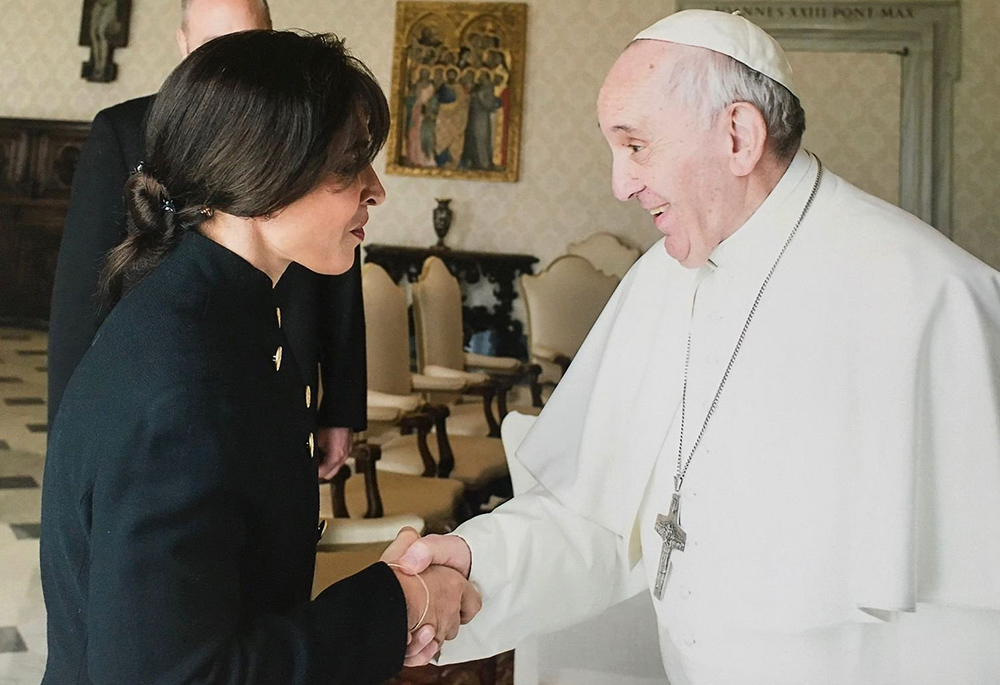
Pope Francis meets Argentine theologian Emilce Cuda at the Vatican in this March 17, 2017, file photo. Cuda serves as co-secretary of the Pontifical Commission for Latin America. On April 13, Francis also named Cuda as a member of the Pontifical Academy of Social Sciences. (CNS/Vatican Media)
When Emilce Cuda's phone rang in the middle of the night in late June 2021, Cardinal Marc Ouellet was on the other line from the Vatican, failing to account for the time difference between Rome and Buenos Aires.
"Will you come work for Pope Francis?" he asked.
"We're moving to Rome," Cuda texted to her family members. They immediately wanted to know the reason and position, but she had forgotten to ask.
"This was a great opportunity to give service to the church in Latin America," she recalled in an interview with NCR. "And when the pope asks you to help, you just say yes."
On July 26, the Vatican's daily bulletin included the news that Cuda, 56, had been appointed as the office head of the Pontifical Commission for Latin America. By September, Cuda and her husband, Patrick, had arrived in Rome.
Five months later, on Feb. 18, Cuda was promoted to co-secretary of the commission, alongside Rodrigo Guerra López. And on April 13, Pope Francis also named Cuda as a member of the Pontifical Academy of Social Sciences.
As a laywoman and theologian from Latin America, her quick ascendancy in a male-dominated, clerical institution underscores the structural changes Pope Francis is seeking to make in the Vatican.
But those who know Cuda say that's only part of the story and that Pope Francis is looking to her to help him hardwire Catholic social thought in the Vatican's operations and beyond.
From Athens to Rome, by way of Buenos Aires
In some respects, Cuda's journey to Rome began in ancient Athens, when she started reading the Greek philosopher Plato at age 11.
When it came time to pursue her undergraduate education, she enrolled at the University of Buenos Aires to study philosophy, but after a few months began to also develop an interest in theological questions.
"In Latin America, you can only study theology in pontifical universities, and those are usually for priests," she said.
But Cuda decided to do both: continue to study philosophy at the public university, while also studying theology at the Pontifical Catholic University of Argentina.
In 2011, she became the first laywoman in Argentina to receive a doctorate in moral theology from the Vatican-backed university, with the signature of its then-chancellor Cardinal Jorge Mario Bergoglio, archbishop of Buenos Aires, adorning her diploma.
At the time, she couldn't have imagined that a decade later, she would be moving nearly 7,000 miles across the globe to go work for the same man who had gone on to become the leader of the Catholic Church.
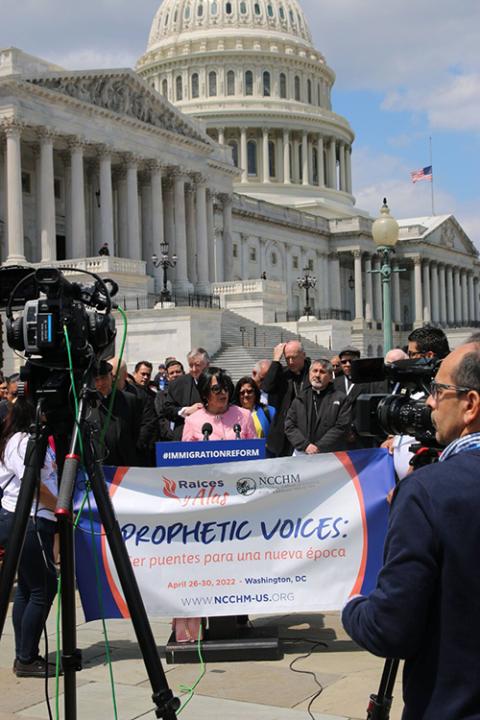
Emilce Cuda speaking April 27 on Capitol Hill as part of the advocacy day for the National Catholic Council for Hispanic Ministry 'Raices y Alas' gathering (Courtesy of Emilce Cuda)
Cuda's one-line sound bite that describes her work is "a theologian focusing on social problems."
And like her boss in Rome, she is interested first and foremost in the people.
As a practitioner of teología del pueblo ("theology of the people"), Cuda not only believes in a preferential option for the poor, but maintains that it requires standing with the poor as a vocal advocate, particularly so that they are participants in economic decision making.
For that reason, her work has zeroed in on questions related to employment and unemployment, labor unions, popular movements and populism.
Anna Rowlands, the St. Hilda Chair in Catholic Social Thought and Practice at Durham University in Great Britain, observed that Cuda's approach to these critical social concerns comes from a global perspective and not just considered a regional or local question.
"The question of work and the question of unemployment, in particular, are absolutely at the forefront of the global challenges that we face right now," Rowlands told NCR. "Her work in that sense so closely ties with Pope Francis' own agenda around work and around social dialogue."
In a new article just published in the Journal of Catholic Social Thought — a special issue that gathers the voices of women across the globe to weigh in on Pope Francis' 2020 encyclical Fratelli Tutti — Cuda writes that Francis understands "the people" as a dynamic uniting together "to save themselves," not motivated by political parties but by a communal understanding of their history, injustices and, ultimately, hope.
"It is about unity in difference, which does not suppose a partisan indoctrination on common interests but, rather, faith in a divine economy of salvation, in the community as a faithful People of God," she writes.
She believes this Latin American perspective, both of hers and of Francis — whom she calls a "prophet of the people" — has lessons to offer the global church.
A bridge between North and South
Earlier this year during a meeting with faculty members from Loyola University Chicago, where Cuda is also an adjunct professor, some colleagues joked that it would be a fun idea to invite Pope Francis to participate in a planned dialogue with students from North, South and Central America and the Caribbean.
Cuda didn't think the idea was such a joke and wrote to the pope to extend the invitation. About one week later, he said yes.
The result was an unscripted two-hour conversation between Francis and students from across the Americas on a range of issues, including migration, the environment, employment and more.
For Francis, who actively took notes throughout the event, it was an opportunity to hear firsthand from young people about their concerns and their dreams. For Cuda, it was an opportunity to connect ideas with people and concrete realities, which she sees as exactly the role of both a theologian and of the office which she was brought to Rome to help transform.
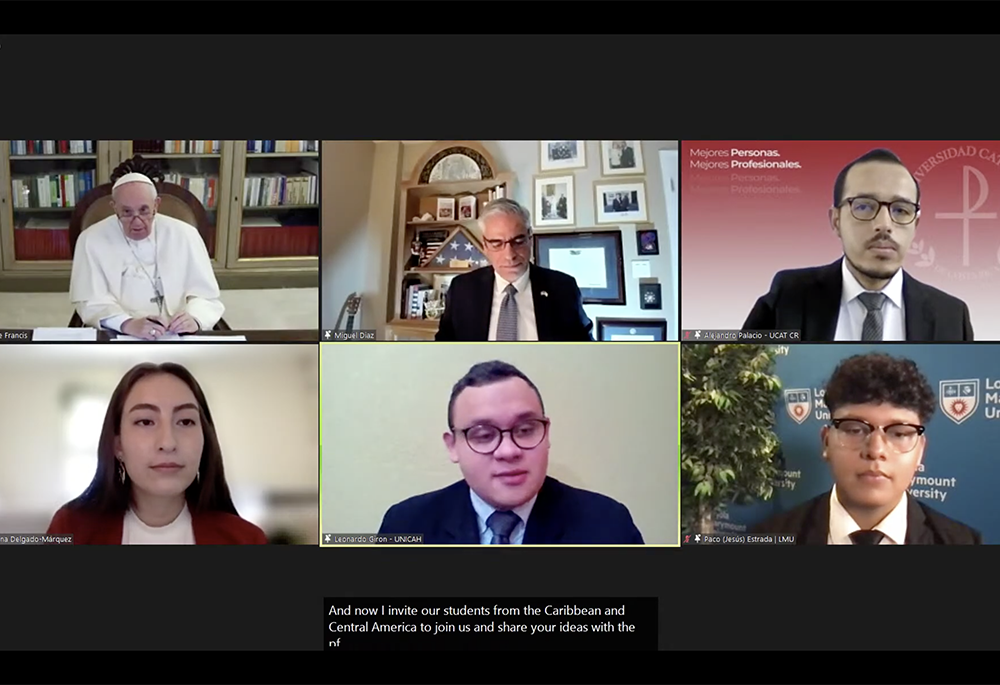
Pope Francis listens to Catholic university students during a virtual dialogue Feb. 24, which Loyola University Chicago hosted in collaboration with Catholic universities and colleges in North, Central and South America, as well as the Caribbean. (NCR screenshot/YouTube)
Pope Pius XII launched the Pontifical Commission for Latin America in 1958 with a mission to study questions related to the "life and development" of the various churches in Latin America, home to nearly 40% of the world's Catholic population.
The commission is situated inside what will soon be renamed as the Vatican's Dicastery for Bishops, and, according to the new Vatican constitution, it is "responsible for fostering relations between the international and national ecclesiastical institutions, which work for the regions of Latin America, and the curial institutions."
While in the past the commission may have had a reputation as a supervisory body or even doctrinally policing the church in Latin America, Cuda sums her role as one of "service" and sees her role as a curia official as being attentive to the needs of Latin America — particularly its people — and finding creative ways to respond.
Since Cuda received that now memorable phone call from Ouellet, prefect of the dicastery and the commission's president, she has made it her mission to "move the frontiers of the commission" so that its borders do not stop at Mexico.
Advertisement
Instead, she wants to build bridges between the North and South, because as she likes to remind people, "we have lots of Latin Americans living in Canada, the United States and even Europe." She believes the social, economic and religious solutions for Latin America must include a connection with all of the important players outside of the continent seeking to help Latin America.
Too often, Cuda said, when people think about Latin Americans living in North America, they are only thought of as migrant workers or "people asking for food."
This way of thinking about Latin Americans must change, says Cuda.
"They must have opportunities to be creative. Because that is work. If work is not creative it's not work," says Cuda.
And since there are people from a range of vocations from Latin America living and working in different capacities outside of it, she believes that the church "must call them, invite them, to help Latin America."
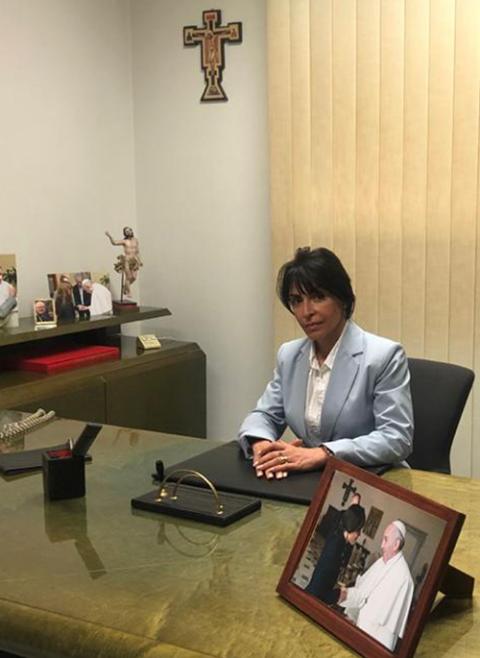
Emilce Cuda in her office at the Vatican (Courtesy of the Pontifical Commission for Latin America)
An outsider inside the heart of the Vatican
Three days after Cuda defended her dissertation, she wrote to Jesuit Fr. James Keenan at Boston College to introduce herself and express interest in a theological conference he was organizing in Trent, Italy.
The conference, held in the same city that hosted the church's landmark ecumenical council nearly 500 years ago, explored how the Council of Trent's proceedings shaped modern life in the church and the world today. Cuda wanted to attend.
"Her theological work is to look at democracy, to look at its impact on Catholic social teaching and to see how the two can correspond to one another," Keenan told NCR. "She's really interested in how you build up things and how you build up relationships, theologically and socially."
Without having met in person and despite the conference registration having already closed, Keenan was intrigued and invited her to participate.
Cuda would go on to become a fixture of the group, becoming a Latin American representative for Catholic Theological Ethics in the World Church, which includes more than 1,500 theologians from around the world who meet regularly in various world cities to discuss burgeoning theological questions.
"She is a natural networker with a great capacity for understanding one person after another and can build bridges," said Keenan, who added that natural capacity to do so is also "reflected in her dissertation."
The fact that she now situates those skills and that perspective inside the Vatican, for Keenan, is a game changer.
Rowlands, author of the recently released Towards a Politics of Communion: Catholic Social Teaching in Dark Times, observed that while Cuda is "profoundly shaped by a Liberationist theological perspective" she is also one of the very few women trained in the traditional Catholic theological method.
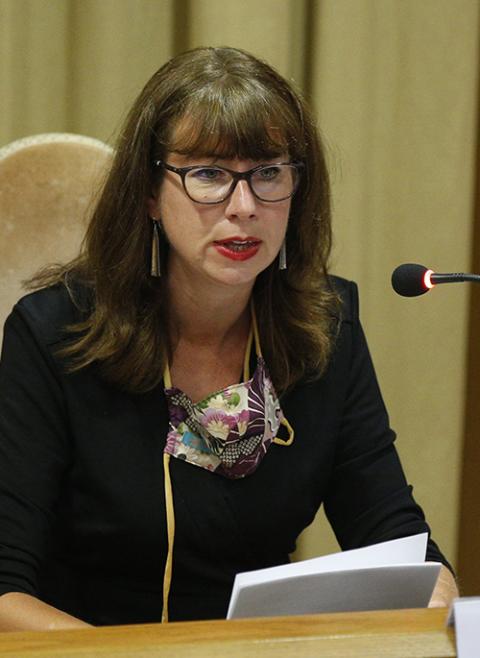
Anna Rowlands, professor of Catholic social thought and practice at Durham University in the United Kingdom, speaks at a press conference for the release of Pope Francis' encyclical, "Fratelli Tutti, on Fraternity and Social Friendship," in the synod hall at the Vatican Oct. 4, 2020. (CNS/Paul Haring)
"She has a pontifical degree and is able to teach within that structure, but yet she's managed to carry this kind of deep radicalism with her into that world, so she's this very unusual combination," said Rowlands. "She's both an insider and an outsider in exactly the right ways."
Since her appointment, where she is now the highest ranking nonreligious laywoman inside the Vatican, Cuda has deflected discussion of what it means to be a woman working inside the church, but instead prefers to focus on the work itself.
It's not that she does not believe that being a woman in the Vatican is insignificant or unimportant. Instead, her energy is concentrated on Pope Francis' project of helping the church recover the depths of the Second Vatican Council, which, she believes if understood properly, makes more space for women and lay leadership inside the church.
Catholic social teaching and synodality
Brazilian journalist Filipe Domingues, who is the deputy director of Rome's Lay Centre and a personal friend of Cuda's, told NCR that it is useful to understand her role and Pope Francis' strong backing of her in light of the pope's focus on synodality, Francis' reform efforts to shape a more participatory church that is able to accompany all of the people of God.
Synodality, observed Domingues, means that the "main processes of the church need to be more inclusive and consultative, they need to start from the concrete reality of the people," not only among the clergy but in the "life and devotion of the ordinary people."
Cuda, he says, embodies this.
While she does not work in the Vatican's synod office, her role and her approach to it has become representative of what it means for church structures to become more synodal in their operations.
It's a difficult mandate, but one that is evidently energizing to Cuda.
'She's both an insider and an outsider in exactly the right ways.'
—Anna Rowlands, speaking about Emilce Cuda
She describes her typical day as waking up between 5 or 6 in the morning and spends the first hour of day in prayer and reading the breviary. After that, she both goes for a run and lifts weights — a workout regime that even intimidates her two young adult sons — and then makes the 20-minute walk from her Vatican apartment in Trastevere to her office just outside of St. Peter's Square.
Most days she either forgets to eat or has canned tuna or fruits that she's stashed in her office. She then spends the rest of the day on calls, messages or in meetings, both virtual or on Zoom, until she goes to bed around midnight, preparing to do it all over again the following day.
Her intense focus on the issues at hand, combined with her indefatigable commitment to the work, has — based on her quick ascendancy in Rome — earned her the strong approval of Francis, who is insisting that what happens at the Vatican and beyond is motivated by Catholic social teaching. In Cuda, he has seemingly found his point person for the task ahead.
At the heart of the Catholic social teaching is the method of "see, judge and act."
From her vantage point, Cuda believes that with the synodal path, "the church is the only institution in the world that opened a popular process of listening, speaking and doing something" in order to engage its members.
And at this moment, as both a front row observer and key player in that process, she believes both Rome and the church, while ancient in its foundations, offer the possibility of being made new.








